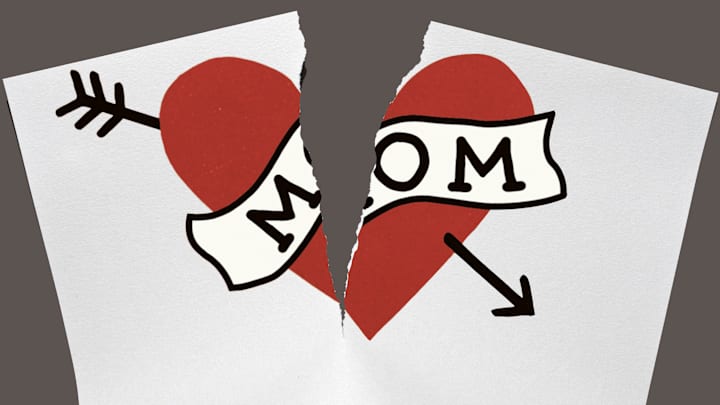Mother’s Day can bring a lot of pressure, thanks to all those ads filled with picture-perfect mommies smiling serenely as their adorable brood showers them with gifts. But that isn’t how it goes for all of us: Maybe you’re a stressed-out parent, hair smeared with yogurt, just trying to get through to naptime without another tantrum. Or maybe your relationship with your own mom is vexed, and you’d rather forget about the whole holiday. But remember—things could be a lot worse. To help give you some perspective, here are five of the most awful mothers in fiction.
- The Embarrassing Mother: Mrs. Bennet from Jane Austen’s Pride and Prejudice (1813)
- The Manipulative Mother: Miss Havisham from Charles Dickens’s Great Expectations (1861)
- The Absent Mother: Mrs. Wormwood from Roald Dahl’s Matilda (1988)
- The Bullying Mother: Mummy from Gail Honeyman’s Eleanor Oliphant is Completely Fine (2017)
- The Abusive Mother: Margaret White from Stephen King’s Carrie (1974)
The Embarrassing Mother: Mrs. Bennet from Jane Austen’s Pride and Prejudice (1813)
Vapid, status-obsessed, and a tendency to get a little too loose-lipped at parties: Mrs. Bennet is a constant embarrassment to her children. Apologists may argue that her obsession with finding husbands for her five daughters is eminently practical, given how the era’s patriarchal laws prohibited them from inheriting their father’s property. But there remains something rather grubby about her approach—the way she schemes for Jane to stay overnight at Netherfield, for example, or her extremely materialistic response when she learns of Elizabeth’s engagement to Mr. Darcy: “How rich and how great you will be! What pin-money, what jewels, what carriages you will have! Jane’s is nothing to it—nothing at all.” Way to pit your daughters against each other, Mrs. B!
Awfulness rating: 3/10
The Manipulative Mother: Miss Havisham from Charles Dickens’s Great Expectations (1861)
What do you do when your no-good fiancée leaves you at the alter? Adopt a daughter and raise her to win then break the hearts of men for your own vengeful pleasure, of course! “[W]hen she first came, I meant to save her from misery like my own,” Miss Havisham recounts to Pip. “But as she grew, and promised to be very beautiful, I gradually did worse, and with my praises, and with my jewels, and with my teachings, and with this figure of myself always before her a warning to back and point my lessons, I stole her heart away and put ice in its place.” Repeat after us, Miss Havisham: My child is not my vicarious plaything, my child is not my vicarious plaything…
Awfulness rating: 6/10
The Absent Mother: Mrs. Wormwood from Roald Dahl’s Matilda (1988)
Mrs. Wormwood is the definition of a neglectful mother (and, yes, Mr. Wormwood is just as bad—but this is a list of bad moms) who blithely abandons her 4-year-old daughter for hours each afternoon to play bingo, totally oblivious of her walking along busy roads to the library all by herself. If it weren’t for the friendly librarian, Mrs. Phelps, Matilda could be in real trouble. Not that Mrs. Wormwood much approves of her young daughter’s precocious reading habit, anyway: “I’m not in favour of blue-stocking girls,” she tells Matilda’s teacher, Miss Honey. “A girl should think about making herself look attractive so she can get a good husband later on. Looks is more important than books.” Poor Matilda!
Awfulness rating: 6/10
The Bullying Mother: Mummy from Gail Honeyman’s Eleanor Oliphant is Completely Fine (2017)
Spoiler alert: Eleanor Oliphant is not completely fine, and the leading cause of her distress is arguably her bullying, bullish, pantomime villain of a mother, who calls her every Wednesday from some mysterious facility in order to bombard her with discouraging, derisive remarks: “Mummy has always told me that I am ugly, freakish, vile,” Eleanor explains. Having been psychologically abused in this manner since childhood, it’s little wonder that Mummy’s vindictive voice has so thoroughly infiltrated 29-year-old Eleanor’s subconscious. Luckily, though, she turns out to be made of stronger stuff.
Awfulness rating: 8/10
The Abusive Mother: Margaret White from Stephen King’s Carrie (1974)
A religious fanatic with a hyperfixation on sexuality-as-sin, Carrie’s mother Margaret bears at least partial responsibility for the deadly monstrosities her daughter eventually performs; after all, her gaslighting and ill-treatment all add to the perception of her as an outsider. Margaret enacts physical, mental, and emotional abuse on her daughter—beating her, berating her, and locking her in the closet to pray: “She was whirled into the closet headfirst and she struck the far wall and fell on the floor in a semidaze. The door slammed and the key turned.” At the end of the novel, she even confesses to almost murdering Carrie as an infant: “ ‘When the pains began I went and got a knife—this knife’—she held it up—‘and waited for you to come so I could make my sacrifice. But I was weak and backsliding. I took this knife in hand again when you were three, and I backslid again. So now the devil has come home.” Not exactly maternal behavior…
Awfulness rating: 10/10
Read More About Books:
